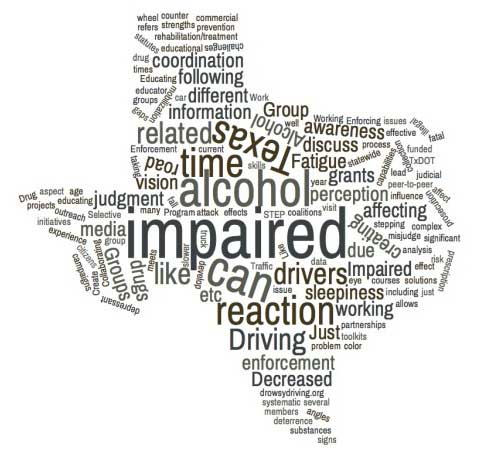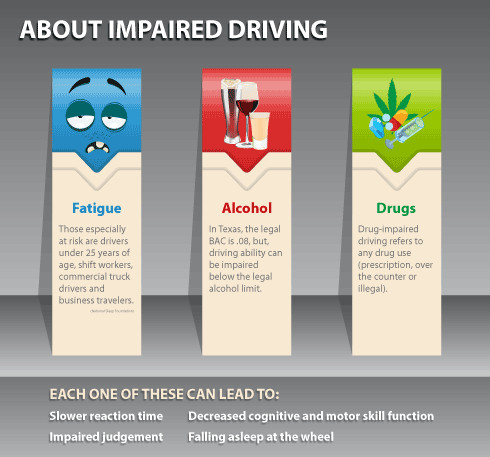
Impaired driving is a problem nationwide. Texas has ranked in the top 10 states for six consecutive years for alcohol-related fatalities per 100 million vehicle miles traveled (NHTSA Driving FACTS). It is important to note that impaired driving refers to alcohol, drug or fatigue-impairment.
The purpose of this website is to create awareness about the impaired driving problem and to offer resources and support for countermeasures against impaired driving.
What is Impaired Driving?
Alcohol-impaired driving
Alcohol has a significant effect on driving skills due to its depressant effects. While under the influence of alcohol, drivers can misjudge their capabilities and experience the following:

- Decreased reaction time due to slower reflexes
- Feelings of drowsiness
- Poor coordination affecting the mechanics of driving (steering, working, braking, etc.)
- Inattention to driving tasks
- Decreased rational decision-making
- Depressed eye movement and perception affecting night vision and color perception
- Inability to judge car’s position on the road, road signs, and the location of other vehicles
(Taibbi, R. How Alcohol Affects You. Current Health, Vol. 2, p. 16-19 (1994).)
Drug-impaired driving
Drug-impaired driving refers to driving after taking any prescription or over the counter drug, or illegal substances. Like alcohol, drugs can decrease your reaction time, affect your coordination, make you fall asleep at the wheel, or lead to inattention while driving.
In 2013, NHTSA’s Fatality Analysis Reporting System (FARS) reported that drugs were present in 40 percent of the fatally-injured drivers with a known test result, almost the same level as alcohol (FARS, 2015). In particular, marijuana use is increasing. As of August 2015, marijuana may be used for medical purposes in 23 states and the District of Columbia (NCSL, 2015a). Recreational use is allowed in Alaska, Colorado, Hawaii, Oregon, Washington and the District of Columbia and 16 other states have decriminalized possession of small amounts of marijuana (NCSL, 2015b).
Fatigue-impaired driving
Fatigue-impaired driving can be just as dangerous as alcohol or drug-impaired driving.
Driving when you’re too tired can have the following affects:
- Impair reaction time, judgment, and vision
- Create problems with information processing and short-term memory
- Decrease performance, vigilance, and motivation
- Increase moodiness and aggressive behaviors
Just like drugs or alcohol, sleepiness slows reaction time, decreases awareness, and impairs judgment. Also similar to alcohol impairment, sleepiness can be fatal when driving. Groups who are especially at risk for fatigue-impaired driving are drivers under 25 years of age, shift workers, commercial truck drivers, and business travelers. For more information, visit drowsydriving.org (National Sleep Foundation).
Texas Impaired Driving Task Force
What began as an informal meeting has evolved over the last 10 years to create the current task force. The task force includes Texas Department of Transportation (TxDOT) subgrantees and other stakeholders not directly affiliated with TxDOT’s Traffic Safety Section.
The task force meets at least twice a year, and provides insight and guidance to TxDOT’s alcohol and other drug countermeasures program.
Members of the task force include representatives from law enforcement, prosecution, adjudication, prevention, advocacy, media development/communications, traffic safety education, treatment, research, training, alcohol service, driver licensing, employers, administrative sanctioning, and public health/medical. The members represent different aspects of the impaired driving issue as well as the geographic and demographic diversity of the state.
Find out more about our members on the Member Spotlight section of the website.
What We’re Doing
Educating
Texas is creating awareness about the impaired driving issue by educating its citizens through educator toolkits, courses, peer-to-peer groups, and media outreach campaigns.
Enforcing
Texas is stepping up enforcement through Selective Traffic Enforcement Program (STEP) grants and impaired driving mobilization grants.
Collaborating
Groups like the Texas Impaired Driving Task Force and statewide coalitions are creating partnerships to attack the problem from many different angles.
The Texas Impaired Driving Task Force and its subcommittees meet several times during the year to discuss current projects funded by TxDOT, as well as the strengths and gaps related to deterrence (statutes, enforcement, prosecution, etc.), judicial issues, prevention (including media and educational initiatives), rehabilitation/treatment, and systematic challenges related to data collection and analysis. This task force allows members to discuss the different aspect of the complex process related to impaired driving and develop effective solutions.


